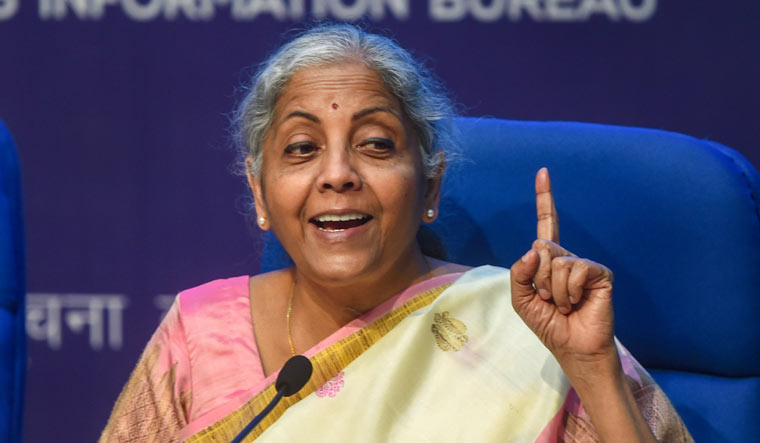Finance Minister Nirmala Sitharaman, on Tuesday, defended the 137-day hiatus in fuel price revision, saying the disruption in supply chains and the resultant increase in global oil prices due to the war in Ukraine was a "couple of weeks" phenomenon resulting in the record hike in petrol and diesel prices in last 8 days.
International oil prices had started moving up days before Russia invaded Ukraine on February 24. The basket of crude oil that India buys averaged USD 100.71 per barrel that day as compared to USD 82 in early November 2021 when state-owned fuel retailers hit the pause button on daily price revision ahead of assembly elections in five states.
On March 9, international prices touched USD 140 a barrel (USD 128.24 for the Indian basket of crude oil) while the fuel retailers re-started daily price revision on March 22.
Replying to a debate on the Budget for 2022-23 in Rajya Sabha, she said opposition members had stated that the war in Ukraine had been raging for a long time and fuel prices are being raised now.
"Absolutely untrue," she said. "The disruption and a resultant increase in the price of global oil and also disruption to supply are all happening since a couple of weeks ago and we are responding to it."
Petrol and diesel prices have been hiked by Rs 4.80 per litre since March 22, a record increase in any eight days since the daily price revision was implemented in June 2017.
Sitharaman said the government is taking various steps in response to the rise in global oil prices.
She blamed the issuance of bonds by the UPA government more than a decade back to oil companies to make up for losses they incurred on selling auto and cooking fuel below cost.
"Taxpayers of today are paying for subsidy dished out to consumers more than a decade ago in the name of oil bonds. And they will continue to pay for the next five years as the redemption of bonds continues till 2026," she said putting the redemption value at Rs 2 lakh crore.
To the opposition party's assertion that oil bonds were first issued by the BJP government between 1999 and 2004, she said Atal Bihari Vajpayee's government had issued bonds worth Rs 9,000 crore as compared to Rs 2 lakh crore by the UPA.
International oil prices during the Vajpayee government were below USD 30 per barrel while they shot up to record levels of USD 147 under the UPA, requiring higher subsidy support in form of oil bonds.
She said the oil bonds issued by the Vajpayee government were "one-time action rather than a continuous policy (as in the UPA)."
"There is a huge difference in the magnitude between Rs 9,000 crore which was one time that had to be repaid on account of Vajpayee government's oil bonds and more than Rs 2 lakh crore which was raised during UPA which is getting paid even now," she said.
"Funding oil at a higher cost has an honest way of doing it and a way in which you book it on somebody else and some other government keeps paying for it. We have not done that," she pointed out.
While the war in Ukraine had posed fresh challenges in the form of higher international oil prices and supply chain disruptions, she went on to state that inflation has been kept under control.





